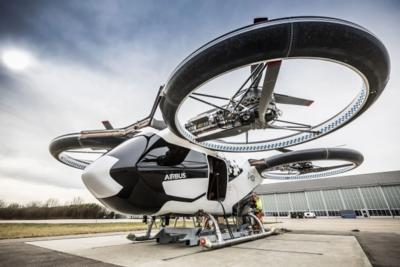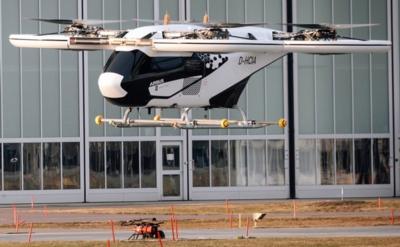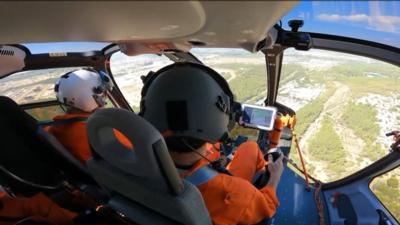At the Confluence of Today and Tomorrow
Airbus Helicopters's demonstrator FlightLab has successfully tested an electric flight control system salient to a new Human Machine Interface (HMI) destined for installation on the company’s CityAirbus NextGen eVTOL prototype. The milestone test occasioned an important step toward the advent of electric-powered Urban Air Mobility (UAM) aircraft.

The flight controls, as tested, have been simplified considerably by dint of the enhanced piloting assistance provided by the electric flight control system. The technology is unique in the helicopter industry insofar as one single stick replaces the three pilot controls (cyclic, collective, and anti-torque pedals) characteristic of conventional helicopters. Using the single stick, the pilot is able to perform all flight maneuvers—e.g., take-off, climb, accelerate, decelerate, turn, hover, pivot, descend, approach, and land.
The single stick takes up less space, facilitates improved pilot visibility, and integrates with a revised HMI which uses simple displays providing a selection of information specifically tailored to eVTOL operations.
Airbus Helicopters head of research and innovation Tomasz Krysisnki stated: “From the start, we designed this system considering every certification parameter in mind as it will be a big step forward in validating the design of our urban air mobility eVTOL, CityAirbus NextGen. The advantage of an electric flight control system is enormous, especially when it comes to reducing pilot workload and ultimately enhancing mission safety. It is also a great example of how our demonstrators are used to mature the techno-bricks necessary to prepare the future of vertical flight.”

In the wake of the successful flight-test campaign, Airbus Helicopters is finalizing the newly-vetted flight-control system in advance of a secondary series of tests to be conducted within the context of Vertex, a project undertaken in partnership with Airbus UpNext—a consortium initiative that seeks to identify, evaluate, mature, and validate new products and services encompassing radical technological breakthroughs.
Under the Vertex banner, Airbus Helicopters and Airbus UpNext will strive jointly to further advance autonomy by managing navigation and simplifying mission preparation.
Airbus remains at the vanguard of electric propulsion and the means by which such technologies may power as-of-yet-unimagined aerial vehicles.
In September 2021, the company unveiled CityAirbus NextGen, an electrically-powered VTOL (eVTOL) personal air vehicle demonstrator intended to plumb the feasibility of near-future air taxi operations.
Presently a piloted, four-passenger, quasi-quad-copter aircraft, Airbus aspires to see the CityAirbus NextGen evolve (devolve?) into a wholly-autonomous vehicle. The machine is being developed in Donauwörth, Germany, with its electrical propulsion system built in Ottobrunn, Munich, Germany.

By way of design, the CityAirbus NextGen eVTOL makes use of a quartet of ducted fans which contributes, ostensibly, to operational safety and a low acoustic signature. The aircraft’s fully-integrated drive-train comprises eight-rotors and an equal-number of one-hundred-kilowatt (130-horsepower) Siemens SP200D direct-drive electric-motors. The fixed-pitch rotors are RPM controlled. System electrical power is supplied by four batteries totaling 110-kilowatt-hours and capable of producing a combined output equaling four-times 140-kilowatts (190-horsepower). So motivated, the aircraft is projected to cruise at 65-knots and remain in flight for 15-minutes on a single charge.
Airbus’s FlightLab initiative affords consortium engineers agile and efficient test beds by which to expediently evaluate technologies. Vehicles developed for the FlightLab program instantiate Airbus’s strategy to incrementally improve its current products and mature technologies salient to future platforms.
 NTSB Final Report: Rutan Long-EZ
NTSB Final Report: Rutan Long-EZ ANN FAQ: Turn On Post Notifications
ANN FAQ: Turn On Post Notifications Classic Aero-TV: ICAS Perspectives - Advice for New Air Show Performers
Classic Aero-TV: ICAS Perspectives - Advice for New Air Show Performers ANN's Daily Aero-Linx (06.28.25)
ANN's Daily Aero-Linx (06.28.25) Aero-News: Quote of the Day (06.28.25)
Aero-News: Quote of the Day (06.28.25)





